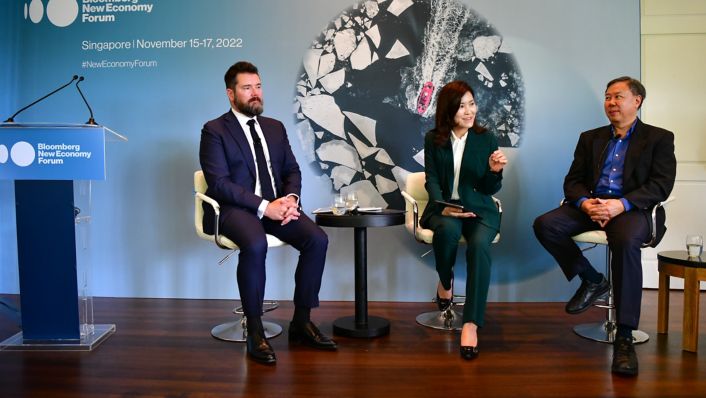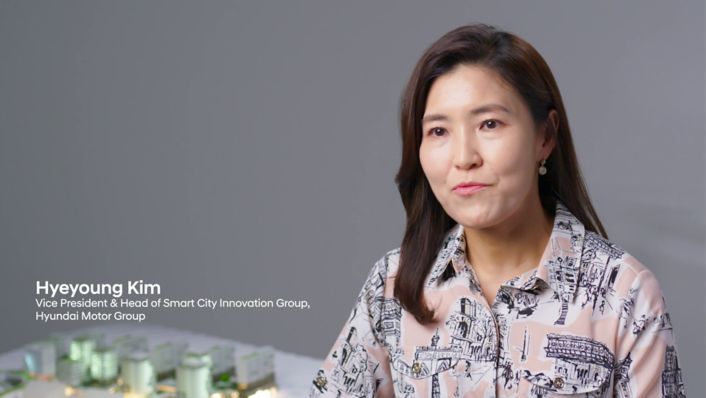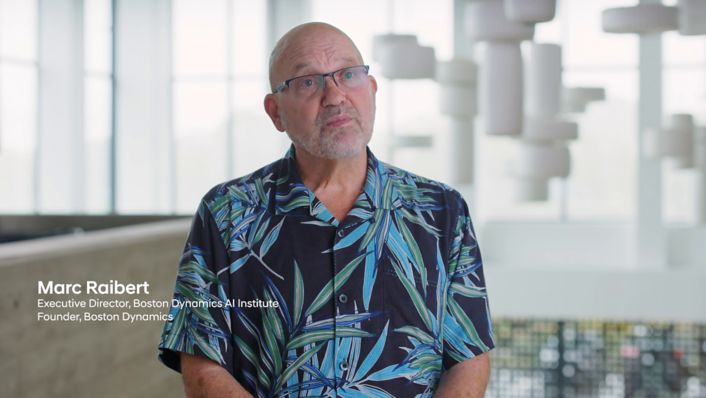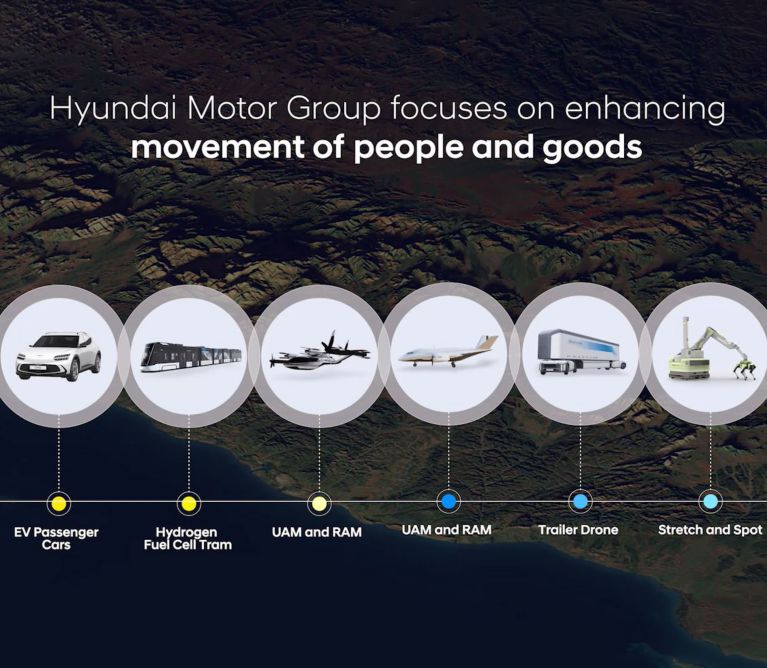- The Group delivered its Smart City vision for mobility, logistics and energy to global leaders and decision-makers at the Bloomberg New Economy Forum (The Forum) in Singapore, Nov. 14-17
- Hyeyoung Kim, VP of the Smart City Innovation Group, delivered the Group’s vision for how smart mobility and logistics can fulfill the promise of smart cities
- Marc Raibert, Executive Director of Hyundai-backed AI Institute, spoke on the benefits that smarter robots can offer humanity
Press material
-
Download
-
Images
Hyundai Motor Group (the Group) presented its vision to accelerate the new economy through smart mobility solutions, such as its Smart City concept and advances in robotics and AI, at the 2022 Bloomberg New Economy Forum (The Forum) in Singapore, Nov. 14-17.
Established in 2018, with the Group as one of its founding partners, the Forum brings together more than 500 of the world’s most influential CEOs, leaders, visionaries, scientists, entrepreneurs and policymakers to find solutions to humanity’s most pressing problems, with the discussions streamed live across the globe.
Hosted by Michael R. Bloomberg, the fifth annual Forum’s guiding theme was ‘Lighting a path through the storm.’ For its part in the event, the Group chose the theme ‘Hyundai accelerates the new economy through its smart mobility solutions,’ encapsulating its unique strengths as a smart mobility and logistics solutions provider for Smart Cities, and a pioneer of robotics and artificial intelligence (AI) technologies.
The Group’s forum participants included Euisun Chung, Hyundai Motor Group Executive Chair; Jaehoon Chang, President and CEO of Hyundai Motor Company; Jaiwon Shin, President and Head of Advanced Air Mobility Division; Hongbum Jung, Senior Vice President and Head of HMGICS; Hyeyoung Kim, Vice President and Head of Smart City Innovation Group; as well as Marc Raibert, Executive Director and Head of AI Institute.

(Hyundai Partner Session at 2022 Bloomberg NEF) From left Nathaniel Bullard, Senior Contributor of Bloomberg NEF and Bloomberg Green; Hyeyoung Kim, Vice President and Head of Smart City Innovation Group at Hyundai Motor Group; and Hugh Lim, Executive Director of Centre for Liveable Cities.
Following the Group’s presentation of its Smart City Vision at the World Cities Summit in Singapore earlier this year, Vice President Kim led the Hyundai Partner Session at the Forum to share why the Group sees smart cities as the future of urban development.
Kim also shared the Group’s progress in developing logistics solutions and highlighted how its groundbreaking technologies and services will bring greater levels of efficiency, convenience and sustainability to Smart Cities. In addition, she revealed details of how the Smart City model can also be applied to legacy cities, such as Paris and London, and not just brand-new metropolis and greenfield sites.
At the partner session, Kim demonstrated how the Group’s Smart City solutions benefit both mobility and logistics. The Group defines mobility as the movement of people using technologies such as purpose-built vehicles (PBVs), autonomous shuttles and car-hailing, along with urban air mobility (UAM) and individualized micro mobility.
Moving people and goods has always been at the center of innovation and prosperity in cities. The Group aims to provide social and economic benefits to Smart City citizens by enhancing the residents’ quality of life, reducing congestion and pollution, and improving efficiency through innovation of its smart mobility and logistics solutions.

Hyeyoung Kim, Vice President and Head of Smart City Innovation Group at Hyundai Motor Group
The Group’s advances in robotics and AI are also integral to its Smart City vision. Group subsidiary Boston Dynamics’ Stretch and Spot robots may one day be employed to increase efficiency in logistics and reduce congestion, benefiting both businesses and citizens of Smart Cities.
The Group defines logistics as the movement of goods, for which it is developing a raft of smart solutions in partnership with its logistics division, Glovis, and IT arm, Autoever. The advanced assets available include autonomous mobile robots (AMRs) for loading/unloading, optimized operation solutions, such as Stretch, and last-mile delivery solutions, such as Spot. The Group will also provide micro-mobility solutions to facilitate the movement of goods.
The Hyundai-backed AI Institute’s Executive Director, Marc Raibert, participated in a roundtable session at the Forum, examining the benefits that future generations of advanced intelligent robots can potentially offer humankind. These include solving the labor shortage in a changing work environment, freeing humans from dirty and dangerous tasks, and supporting smart logistics to enable Smart Cities.
Raibert elaborated on the Group’s ambitions to create robots with cognitive and athletic intelligence, allowing for greater situational awareness, perception and reasoning as well as the ability to harness those traits to understand and plan their own behavior.
Robots already have some impressive physical skills, but they remain limited in their ability to process what is going on around them, interpret the actions of others, and use that understanding to plan their own behavior. Developing the perception, situational understanding, reasoning and other cognitive functions underpinning these abilities is critical to achieving the true potential of robotics and other types of intelligent machines. Once they have those abilities, in addition to even more advanced physical skills, they will start freeing humans from dangerous and strenuous work, increase productivity, and help people live better lives.

Marc Raibert, Executive Director of Boston Dynamics AI Institute
While robotics technology has developed significantly in recent years, with today’s robots able to independently perform inspection tasks, work in warehouses and even dance, the field still holds an enormous amount of unrealized potential. Despite being adept at a number of physical skills, robots remain largely unable to understand and adapt to the world around them, requiring large amounts of human programming and making them less efficient and more difficult to deploy in practical situations.
Through its work at the AI Institute, the Group will seek to develop technology to make robots more intelligent, broaden the range of tasks they can execute, and enhance their useability. They will be able to learn how to undertake new tasks by watching humans perform them, test other machines to ensure they are working properly, and appropriately diagnose and repair any problems they detect.













